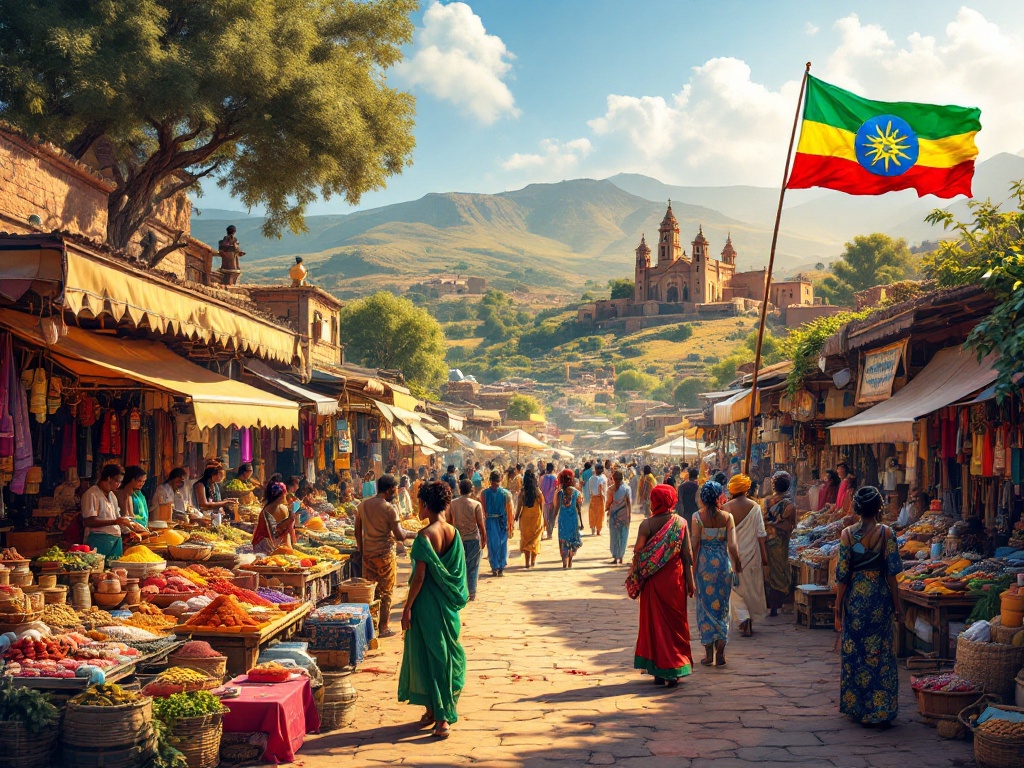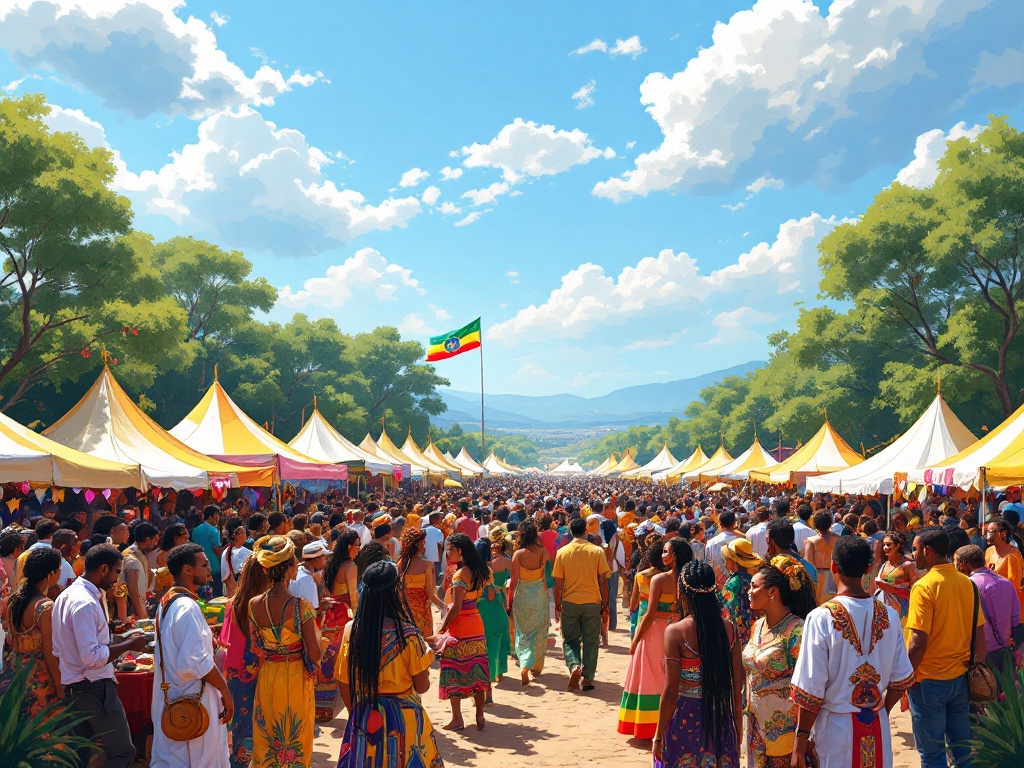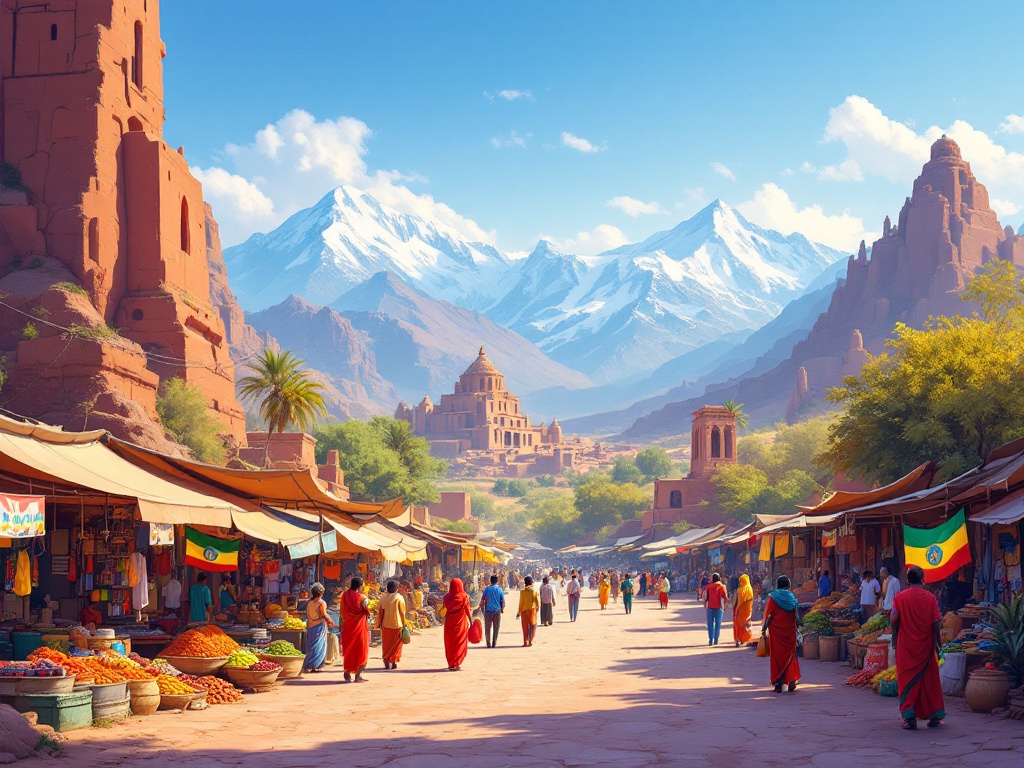Essential Information for Your Journey
Key facts and information to help you prepare for your trip to Ethiopia.
Ethiopia has diverse climates due to its varied topography. The country generally experiences:
Best Times to Visit by Region:
Festivals: Consider timing your visit to coincide with major Ethiopian festivals:
Currency Exchange:
ATMs and Credit Cards:
Estimated Daily Costs:
Tipping: Not obligatory but appreciated. 10% is standard in restaurants that don't include service charge.
Discover the incredible diversity of Ethiopia's landscapes, history, and culture.

Home to 11 medieval monolithic churches carved out of rock, Lalibela is a UNESCO World Heritage site and one of Ethiopia's holiest cities. These remarkable 12th-century churches were built during the reign of King Lalibela and remain active places of worship today.
Don't Miss: Attending a traditional church service, exploring the underground tunnels connecting the churches, and witnessing the pilgrimage during Ethiopian Christmas (January 7).

This UNESCO World Heritage site features dramatic landscapes with deep valleys, jagged peaks, and some of Africa's highest mountains. The park is home to rare wildlife including the Ethiopian wolf, walia ibex, and gelada baboons.
Don't Miss: Trekking to Ras Dashen (Ethiopia's highest peak), watching gelada baboons in their natural habitat, and enjoying spectacular sunrise views from Chenek camp.

One of the hottest and lowest places on Earth, this geological wonder features alien landscapes with colorful sulfur springs, salt flats, lava lakes, and mineral formations. The area is home to the Afar people who mine salt using traditional methods.
Don't Miss: The otherworldly acid pools of Dallol, watching the sunset over Lake Asale's salt flats, and visiting the continuously active Erta Ale volcano.

Known as the "Camelot of Africa," Gondar was Ethiopia's royal capital in the 17th and 18th centuries. The city is famous for its medieval castles and elaborately decorated churches built by Emperor Fasilides and his successors.
Don't Miss: Exploring the Royal Enclosure (Fasil Ghebbi), visiting Debre Berhan Selassie Church with its famous ceiling of painted angels, and experiencing Timkat celebrations if visiting in January.

Home to some of Africa's most fascinating ethnic groups, the Lower Omo Valley offers a glimpse into traditional ways of life that have remained largely unchanged for centuries. Various tribes including the Mursi, Hamer, Karo, and Daasanach maintain their unique cultural practices.
Don't Miss: Visiting local markets, witnessing traditional ceremonies (if timing permits), and learning about indigenous crafts and body adornment traditions.

Ethiopia's capital and largest city serves as the political and cultural hub of the country. Founded in 1886, this vibrant metropolis sits at an elevation of 2,355 meters (7,726 feet) and is home to important museums, historic churches, and the African Union headquarters.
Don't Miss: The National Museum (home to "Lucy" fossil), Holy Trinity Cathedral, Merkato (Africa's largest open-air market), and traditional Ethiopian coffee ceremonies.
Understanding Ethiopian culture will enhance your travel experience and help you connect with local people.
Ethiopians typically greet each other with a handshake and shoulder bump. When meeting someone of importance or an elder, it's respectful to slightly bow while shaking hands.
Ethiopia is a conservative country, especially in rural areas. Both men and women should dress modestly:
Always ask permission before photographing people, especially in rural areas and around religious sites. In some regions, particularly the Omo Valley, people may expect payment for photographs.
Religion plays a central role in Ethiopian life:
Ethiopian cuisine is unique and flavorful, characterized by spicy stews (wats) served on injera, a sourdough flatbread made from teff flour.
Ethiopia is the birthplace of coffee, and the traditional coffee ceremony is an important cultural ritual:
Ethiopia uses its own calendar system that is approximately 7-8 years behind the Gregorian calendar:
Ethiopia also uses a different time system:
Important information to ensure a safe and healthy trip to Ethiopia.
Consult with a travel health professional 4-8 weeks before your trip. Recommended vaccinations may include:
Malaria prevention is recommended for most areas below 2,500 meters elevation (Addis Ababa is generally considered malaria-free due to its altitude).
Many tourist destinations in Ethiopia are at high altitude:
Allow time to acclimatize, stay hydrated, avoid alcohol, and consider medication if you're prone to altitude sickness.
Some areas of Ethiopia have specific security concerns:
Medical facilities in Ethiopia are limited, especially outside Addis Ababa:
Information on getting to and around Ethiopia.
Addis Ababa Bole International Airport (ADD) is the main gateway to Ethiopia and a major hub for African travel:
Most visitors require a visa to enter Ethiopia:
For long distances, domestic flights are the most time-efficient option:
Private Car Hire:
Buses: